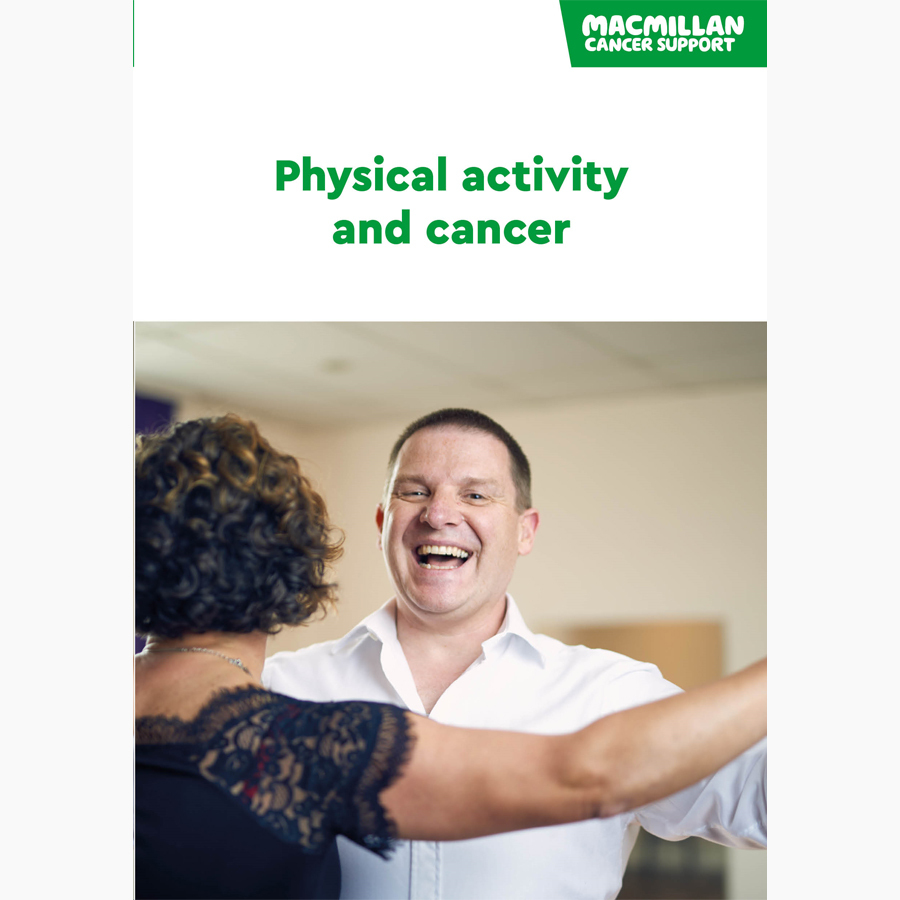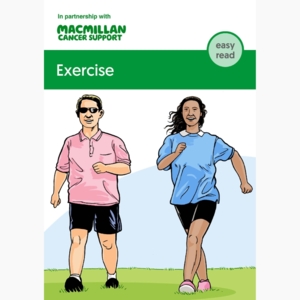Eating well and keeping active during and after cancer treatment
On this page
Healthy eating
After a cancer diagnosis, many people find making the decision to follow a healthy, balanced diet helps give them back a sense of control. It can also help you feel that you are doing the best for your health.
Eating well and keeping to a healthy weight will help you keep up your strength, increase your energy levels and improve your sense of well-being.
After cancer treatment, some people have a higher risk of other health problems, including diabetes, heart disease or osteoporosis (bone thinning). If you have been told that you may be at an increased risk of any of these conditions, it is especially important to follow a healthy diet to help prevent them.
Before making changes to your diet, it can help to talk to a dietitian, your GP or a specialist nurse. This may be especially useful if you have any special dietary requirements or medical needs.
Following a cancer diagnosis people often have questions about their diet and what they should be eating and drinking. Macmillan Oncology Dietitians Lindsey Allan and Nicola Porter at the Royal Surrey NHS Foundation Trust have created 18 short videos about diet and cancer. These videos aim to increase people’s confidence in managing their diet before, during and after treatment.
We have more information about healthy eating and cancer.
Staying active
There are lots of benefits to staying active when you are living with cancer.
If you have just been diagnosed, physical activity can help you get as ready for treatment as you can be. It may reduce your risk of having side effects or mean side effects are less severe. It may help you recover more quickly.
During and after cancer treatment, staying active may help you:
- maintain your fitness, strength, and mental well-being
- manage ongoing side effects such as tiredness (fatigue)
- reduce your risk of late effects after treatment.
Research also suggests that along with having a healthy diet, being physically active can help reduce the risk of some cancer types coming back.
Getting started
Being active before, during and after cancer treatment is generally safe. Any activity will help maintain or improve your fitness, health and well-being. Before starting any physical activity plan, it is important to talk to a healthcare professional.
If you need ideas to help you get started or advice about finding activities near you, our information about types of physical activity may help. We also have information about exercising safely when you have cancer.
There is not a single activity that is best for everyone. The important thing is to choose something that fits in with your life. If you already exercised before treatment, you may find you need to do it at a slower pace or lower intensity during treatment.
If you feel unfit and treatment is making you feel very tired, then you could start gently, by trying to:
- reduce the amount of time you spend sitting or lying down
- do some light housework or gardening
- go for a walk.
We Are Undefeatable supports people with a range of long term health conditions, including cancer, to be active. Their website offers information, ideas and activity videos to help everyone find something that works for them.
It is important to get advice from your healthcare team about exercise and making changes to your diet.
Booklets and resources
About our information
This information has been written, revised and edited by Macmillan Cancer Support’s Cancer Information Development team. It has been reviewed by expert medical and health professionals and people living with cancer.
-
References
Below is a sample of the sources used in our information about eating well and keeping active. If you would like more information about the sources we use, please contact us at informationproductionteam@macmillan.org.uk
National Institute for Health and Care Excellence. NICE. Obesity: identification, assessment and management. CG189. Last updated: 26 July 2023. Available from www.nice.org.uk/guidance/cg189/chapter/Recommendations#identifying-and-assessing-overweight-obesity-and-central-adiposity [accessed July 2025]
NHS.UK. Physical activity guidelines for adults aged 19 to 64. May 2024.Available from www.nhs.uk/live-well/exercise/exercise-guidelines/physical-activity-guidelines-for-adults-aged-19-to-64/ [accessed July 2025].
British Dietetic Association BDA. Food labelling: nutrition information. Available from. www.bda.uk.com/resource/food-labelling-nutrition-information.html [accessed July 2025].
World Cancer Research fund (WCRF) website. www.wcrf.org/ [accessed July 2025].
The Eatwell guide. NHS. Available from www.nhs.uk/live-well/eat-well/food-guidelines-and-food-labels/the-eatwell-guide [accessed July 2025].
Date reviewed

Our cancer information meets the PIF TICK quality mark.
This means it is easy to use, up-to-date and based on the latest evidence. Learn more about how we produce our information.
The language we use
We want everyone affected by cancer to feel our information is written for them.
We want our information to be as clear as possible. To do this, we try to:
- use plain English
- explain medical words
- use short sentences
- use illustrations to explain text
- structure the information clearly
- make sure important points are clear.
We use gender-inclusive language and talk to our readers as ‘you’ so that everyone feels included. Where clinically necessary we use the terms ‘men’ and ‘women’ or ‘male’ and ‘female’. For example, we do so when talking about parts of the body or mentioning statistics or research about who is affected.
You can read more about how we produce our information here.






